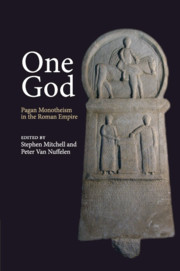Book contents
- Frontmatter
- Contents
- Preface and acknowledgements
- List of abbreviations
- 1 Introduction: the debate about pagan monotheism
- 2 Pagan monotheism as a religious phenomenon
- 3 Pagan ritual and monotheism
- 4 The case for pagan monotheism in Greek and Graeco-Roman antiquity
- 5 Monotheism between cult and politics: the themes of the ancient debate between pagan and Christian monotheism
- 6 The price of monotheism: some new observations on a current debate about late antiquity
- 7 Megatheism: the search for the almighty god and the competition of cults
- 8 Deus deum … summorum maximus (Apuleius): ritual expressions of distinction in the divine world in the imperial period
- 9 Further thoughts on the cult of Theos Hypsistos
- Bibliography
- General index
- Index of authors, works and citations
5 - Monotheism between cult and politics: the themes of the ancient debate between pagan and Christian monotheism
Published online by Cambridge University Press: 20 May 2010
- Frontmatter
- Contents
- Preface and acknowledgements
- List of abbreviations
- 1 Introduction: the debate about pagan monotheism
- 2 Pagan monotheism as a religious phenomenon
- 3 Pagan ritual and monotheism
- 4 The case for pagan monotheism in Greek and Graeco-Roman antiquity
- 5 Monotheism between cult and politics: the themes of the ancient debate between pagan and Christian monotheism
- 6 The price of monotheism: some new observations on a current debate about late antiquity
- 7 Megatheism: the search for the almighty god and the competition of cults
- 8 Deus deum … summorum maximus (Apuleius): ritual expressions of distinction in the divine world in the imperial period
- 9 Further thoughts on the cult of Theos Hypsistos
- Bibliography
- General index
- Index of authors, works and citations
Summary
The debate about pagan monotheism, which was sparked by the publication of Athanassiadi and Frede's Pagan Monotheism in Late Antiquity and the critical response that it provoked, has run for several years, and has led to numerous related publications. The span of these contributions is wide and extends from the ancient Near East and Egypt to ancient Israel and Hellenistic Judaism, and as far as classical Greece, the Hellenistic world and the Roman imperial period up to Christian late antiquity.
This contribution does not aim to undertake another thematic approach but to pose the basic question of what the ancient discourse between pagan and Christian monotheists was in fact about. Monotheism was already a topic for discussion between Christians and non-Christians in the imperial Roman age, and this lent an explosive quality to the issue of what could be called monotheism in antiquity. Both types of monotheism were defined by rapprochements and confrontations, and these brought a series of issues to the surface. What were the basic themes of this discussion? What were the front lines that were established in this debate? How did the disputants conceive their respective positions, and what were the charges they brought against one another? I tackle these questions in the context of two controversies: those between Augustine and the Platonists and between Celsus and Origen.
- Type
- Chapter
- Information
- One GodPagan Monotheism in the Roman Empire, pp. 82 - 99Publisher: Cambridge University PressPrint publication year: 2010
- 2
- Cited by



